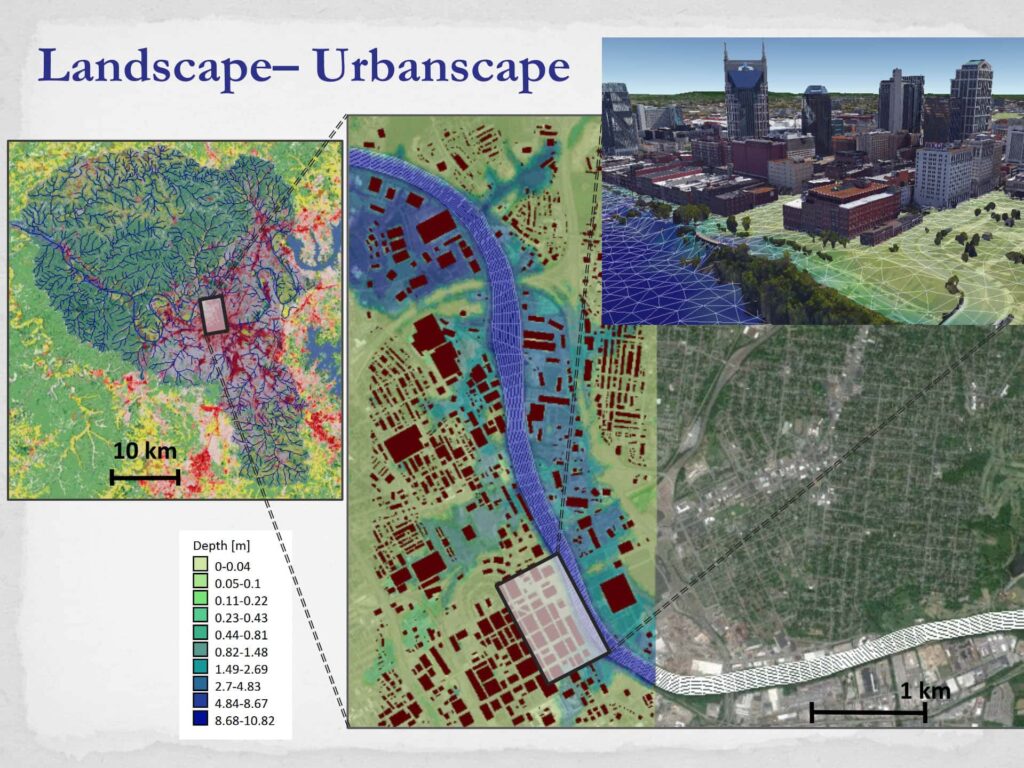
$7.5 million to predict and communicate flood risk
Engineers, atmospheric scientists, psychologists and anthropologists team up to develop better flood predictions and ensure decision-makers can understand them.

Engineers, atmospheric scientists, psychologists and anthropologists team up to develop better flood predictions and ensure decision-makers can understand them.
To reduce the human and economic costs of extreme flooding events, which are on the rise due to climate change, a team led by the University of Michigan is bringing together researchers in science, technology and the humanities for better flood risk predictions and better decision-making in response to those risks.
They are supported with a 5-year, $7.5 million grant from the Office of Naval Research, through the Department of Defense Multidisciplinary University Research Initiatives (MURI) Program.
The devastating floods that ripped through the northeast are among the most recent in a long string of severe flooding events occurring worldwide, which make it plain that better flood predictions and safety plans are needed. According to the Organization for Economic Cooperation and Development, flooding causes $8 billion in losses on average annually in the U.S. alone.
“Climate change is increasing the likelihood of extreme flooding—and particularly in urban areas. In the past four decades, 99% of U.S. counties were impacted by flooding, and since 2000, there have been 1,782 flood related fatalities,” said Valeriy Ivanov, co-principal investigator and professor of civil and environmental engineering.
The team seeks to provide better answers to crucial questions that arise when communities are at imminent risk of flood. What are the chances the flood occurs, and how bad could it be? Where might flooding occur in the future as the climate continues to change? What information do leaders need to make decisions about evacuation? The goal of their project is to develop a suite of methods and case studies that ultimately will help leaders decide what actions need to be taken when a flood may be coming.
“We are looking at the full pipeline, from predictions and models to the psyche of decision makers where it will affect society,” said Xun Huan, co-principal investigator and assistant professor of mechanical engineering.
The team plans to collect data from two areas, one located in Michigan and the other in Texas, and run many computer simulations to determine the possibility and impacts of floods in the current climate—and under different scenarios of future climate. In addition to improving the accuracy of their simulations, they hope to find strategies, solutions and actions that can mitigate the impact of floods, minimizing the harm.

One key concern is measuring and communicating the uncertainties in their predictions. Similar to weather forecasts that provide a percent chance of rain on a given day, the team is designing a model that can provide information on the likelihood of the flood hazard and which communities may be impacted. This is of paramount importance for flood resilience and preparedness as well as supporting real-time decision-making immediately before, during and after flood events.
“Uncertainty plays an important role in decision-making, where one needs to consider what scenarios might play out and how likely. The importance of these considerations are further elevated when decisions have high consequences, for example when deciding whether to evacuate when faced with potential major flooding that may cause property damage and endanger people’s lives,” said Huan.
Another part of the project focuses on human decision-makers and what matters to them when making difficult choices.
“We want to find out what information from the data and modeling are important for human users and decision-makers to know, how this information can be expressed in a useful and understandable manner, and how do these priorities change from community to community,” said Nikola Banovic, an assistant professor of computer science and engineering and a participating investigator, bringing expertise in human-computer interaction.
To find these answers, the engineers and atmospheric scientists will team up with psychologists and anthropologists.
“With climate change, new geographic areas will likely experience flooding for the first time, presenting interesting opportunities for behavioral science research to contribute to the overall effort of maximizing safety,” said Richard Gonzalez, the Amos N. Tversky Collegiate Professor of Psychology and Statistics at U-M and a participating investigator.
“This project will develop advanced mathematical models, but for these models to be useful and effective for policy makers and the general population, behavioral scientists can contribute evidence-based models to understanding the human-in-the-loop problem,” he added.
With more robust predictions and best practices for communicating about them, the team will then develop casebooks to help present data to leaders when their constituencies face flood risks.
By taking into account probabilities and risks along with other elements such as practicality, psychology, and societal and cultural effects, the team seeks to improve near- and long-term decision-making strategies.
The project includes researchers from Boise State University and the University of Illinois Urbana Champaign as well as stakeholders from Department of Defense facilities in the Detroit Area. Project ideas initially started with seed funding from the Michigan Institute for Computational Discovery and Engineering, which enabled researchers from multiple disciplines to come together and focus on computational aspects of the flooding problem.